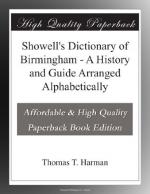Preaching Sermons.—By Salusbury’s Charity, 1726, the Rectors of St. Martin’s and St. Philip’s are entitled to the sum of 15s to preach sermons once a year for the benefit of the Blue Coat School—Ingram’s Charity, 1818, consisting of the yearly interest of L500 4 per cent. India Stock, was intended to insure the preaching of an annual sermon on the subject of kindness to animals (especially to the horse) by a local clergyman of the Established Church, but the Governors of King Edward’s School, who are the trustees, have obtained the sanction of the Charity Commissioner to a scheme under which sermons on kindness to animals may take the form of one or more free lectures on the kind treatment of animals, and especially of the horse, to be delivered in any place of public worship, or other building or room approved by the trustees, and not necessarily, as heretofore, by a clergyman of the Established Church, and in a church.
Scripture Reading.—In 1858 Admiral Duff left a sum of money, which brings in about L45 per year, for the maintenance of a Scripture Reader for the town of Birmingham. The trustee of this land is the Mayor for the time being, and the Scripture Reader may be heard of at the Town Clerk’s office.
The Whittingham Charity, distributed at St. James’s, Ashted, in March, furnishes gifts to about eighty poor people (principally widows), who receive blankets, sheets, quilts, flannel, &c., in addition to bread and coal.
Philosophical Society.—A society with this name was formed in 1794 for the promulgation of scientific principles among mechanics. Its meetings were held in an old warehouse in the Coach Yard, and from the fact that many workmen from the Eagle Foundry attended the lectures, delivered mainly by Mr. Thomas Clarke, the members acquired the name of “the cast-iron philosophers.” Another society was formed in 1800, for the diffusion of scientific knowledge amongst the middle and higher classes, and by the year 1814 it was possessed of a handsome Lecture Theatre, a large Museum, with good collections of fossils and minerals, a Library, Reading Room, &c., in Cannon Street. Like many other useful institutions of former days, the philosophical has had to give way to the realistic, its library of dead men’s writings, and its fossils of the ancient world, vanishing in face of the reporters of to-day’s doings, the ubiquitous throbs of the “Walter” and “Hoe” steam presses resounding where erst the voice of Science in chronicling the past foreshadowed the future.
Pillory.—This ancient machine for the punishment of prigs formerly stood in High Street. The last time it was used was in 1813. We pillory people in print now, and pelt them with pen and ink. The Act for abolishing this method of punishment was not passed until June 30, 1837. What became of the pillory here is not known, but there is, or was lately, a renovated specimen of the article at Coleshill.




